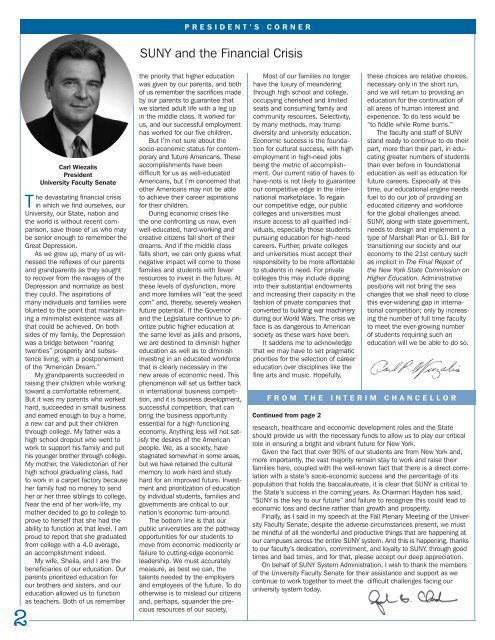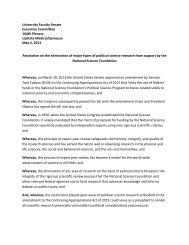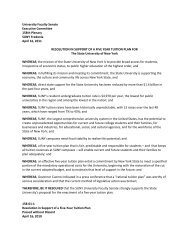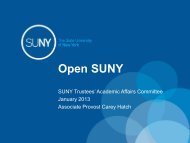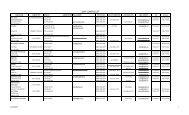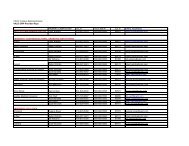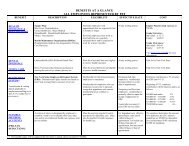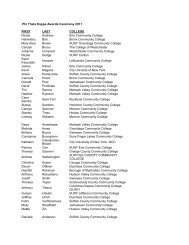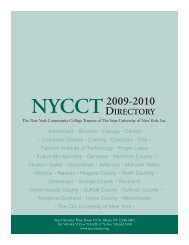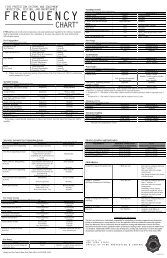Layout 1 copy - The State University of New York
Layout 1 copy - The State University of New York
Layout 1 copy - The State University of New York
You also want an ePaper? Increase the reach of your titles
YUMPU automatically turns print PDFs into web optimized ePapers that Google loves.
P R E S I D E N T ’ S<br />
C O R N E R<br />
SUNY and the Financial Crisis<br />
2<br />
Carl Wiezalis<br />
President<br />
<strong>University</strong> Faculty Senate<br />
<strong>The</strong> devastating financial crisis<br />
in which we find ourselves, our<br />
<strong>University</strong>, our <strong>State</strong>, nation and<br />
the world is without recent comparison,<br />
save those <strong>of</strong> us who may<br />
be senior enough to remember the<br />
Great Depression.<br />
As we grew up, many <strong>of</strong> us witnessed<br />
the reflexes <strong>of</strong> our parents<br />
and grandparents as they sought<br />
to recover from the ravages <strong>of</strong> the<br />
Depression and normalize as best<br />
they could. <strong>The</strong> aspirations <strong>of</strong><br />
many individuals and families were<br />
blunted to the point that maintaining<br />
a minimalist existence was all<br />
that could be achieved. On both<br />
sides <strong>of</strong> my family, the Depression<br />
was a bridge between “roaring<br />
twenties” prosperity and subsistence<br />
living, with a postponement<br />
<strong>of</strong> the “American Dream.”<br />
My grandparents succeeded in<br />
raising their children while working<br />
toward a comfortable retirement.<br />
But it was my parents who worked<br />
hard, succeeded in small business<br />
and earned enough to buy a home,<br />
a new car and put their children<br />
through college. My father was a<br />
high school dropout who went to<br />
work to support his family and put<br />
his younger brother through college.<br />
My mother, the Valedictorian <strong>of</strong> her<br />
high school graduating class, had<br />
to work in a carpet factory because<br />
her family had no money to send<br />
her or her three siblings to college.<br />
Near the end <strong>of</strong> her work-life, my<br />
mother decided to go to college to<br />
prove to herself that she had the<br />
ability to function at that level. I am<br />
proud to report that she graduated<br />
from college with a 4.0 average,<br />
an accomplishment indeed.<br />
My wife, Sheila, and I are the<br />
beneficiaries <strong>of</strong> our education. Our<br />
parents prioritized education for<br />
our brothers and sisters, and our<br />
education allowed us to function<br />
as teachers. Both <strong>of</strong> us remember<br />
the priority that higher education<br />
was given by our parents, and both<br />
<strong>of</strong> us remember the sacrifices made<br />
by our parents to guarantee that<br />
we started adult life with a leg up<br />
in the middle class. It worked for<br />
us, and our successful employment<br />
has worked for our five children.<br />
But I’m not sure about the<br />
socio-economic status for contemporary<br />
and future Americans. <strong>The</strong>se<br />
accomplishments have been<br />
difficult for us as well-educated<br />
Americans, but I’m concerned that<br />
other Americans may not be able<br />
to achieve their career aspirations<br />
for their children.<br />
During economic crises like<br />
the one confronting us now, even<br />
well-educated, hard-working and<br />
creative citizens fall short <strong>of</strong> their<br />
dreams. And if the middle class<br />
falls short, we can only guess what<br />
negative impact will come to those<br />
families and students with fewer<br />
resources to invest in the future. At<br />
these levels <strong>of</strong> dysfunction, more<br />
and more families will “eat the seed<br />
corn” and, thereby, severely weaken<br />
future potential. If the Governor<br />
and the Legislature continue to prioritize<br />
public higher education at<br />
the same level as jails and prisons,<br />
we are destined to diminish higher<br />
education as well as to diminish<br />
investing in an educated workforce<br />
that is clearly necessary in the<br />
new areas <strong>of</strong> economic need. This<br />
phenomenon will set us farther back<br />
in international business competition,<br />
and it is business development,<br />
successful competition, that can<br />
bring the business opportunity<br />
essential for a high-functioning<br />
economy. Anything less will not satisfy<br />
the desires <strong>of</strong> the American<br />
people. We, as a society, have<br />
stagnated somewhat in some areas,<br />
but we have retained the cultural<br />
memory to work hard and study<br />
hard for an improved future. Investment<br />
and prioritization <strong>of</strong> education<br />
by individual students, families and<br />
governments are critical to our<br />
nation’s economic turn-around.<br />
<strong>The</strong> bottom line is that our<br />
public universities are the pathway<br />
opportunities for our students to<br />
move from economic mediocrity or<br />
failure to cutting-edge economic<br />
leadership. We must accurately<br />
measure, as best we can, the<br />
talents needed by the employers<br />
and employees <strong>of</strong> the future. To do<br />
otherwise is to mislead our citizens<br />
and, perhaps, squander the precious<br />
resources <strong>of</strong> our society.<br />
Most <strong>of</strong> our families no longer<br />
have the luxury <strong>of</strong> meandering<br />
through high school and college,<br />
occupying cherished and limited<br />
seats and consuming family and<br />
community resources. Selectivity,<br />
by many methods, may trump<br />
diversity and university education.<br />
Economic success is the foundation<br />
for cultural success, with high<br />
employment in high-need jobs<br />
being the metric <strong>of</strong> accomplishment.<br />
Our current ratio <strong>of</strong> haves to<br />
have-nots is not likely to guarantee<br />
our competitive edge in the international<br />
marketplace. To regain<br />
our competitive edge, our public<br />
colleges and universities must<br />
insure access to all qualified individuals,<br />
especially those students<br />
pursuing education for high-need<br />
careers. Further, private colleges<br />
and universities must accept their<br />
responsibility to be more affordable<br />
to students in need. For private<br />
colleges this may include dipping<br />
into their substantial endowments<br />
and increasing their capacity in the<br />
fashion <strong>of</strong> private companies that<br />
converted to building war machinery<br />
during our World Wars. <strong>The</strong> crisis we<br />
face is as dangerous to American<br />
society as these wars have been.<br />
It saddens me to acknowledge<br />
that we may have to set pragmatic<br />
priorities for the selection <strong>of</strong> career<br />
education over disciplines like the<br />
fine arts and music. Hopefully,<br />
Continued from page 2<br />
these choices are relative choices,<br />
necessary only in the short run,<br />
and we will return to providing an<br />
education for the continuation <strong>of</strong><br />
all areas <strong>of</strong> human interest and<br />
experience. To do less would be<br />
“to fiddle while Rome burns.”<br />
<strong>The</strong> faculty and staff <strong>of</strong> SUNY<br />
stand ready to continue to do their<br />
part, more than their part, in educating<br />
greater numbers <strong>of</strong> students<br />
than ever before in foundational<br />
education as well as education for<br />
future careers. Especially at this<br />
time, our educational engine needs<br />
fuel to do our job <strong>of</strong> providing an<br />
educated citizenry and workforce<br />
for the global challenges ahead.<br />
SUNY, along with state government,<br />
needs to design and implement a<br />
type <strong>of</strong> Marshall Plan or G.I. Bill for<br />
transitioning our society and our<br />
economy to the 21st century such<br />
as implicit in <strong>The</strong> Final Report <strong>of</strong><br />
the <strong>New</strong> <strong>York</strong> <strong>State</strong> Commission on<br />
Higher Education. Administrative<br />
positions will not bring the sea<br />
changes that we shall need to close<br />
this ever-widening gap in international<br />
competition; only by increasing<br />
the number <strong>of</strong> full time faculty<br />
to meet the ever-growing number<br />
<strong>of</strong> students requiring such an<br />
education will we be able to do so.<br />
F R O M T H E I N T E R I M C H A N C E L L O R<br />
research, healthcare and economic development roles and the <strong>State</strong><br />
should provide us with the necessary funds to allow us to play our critical<br />
role in ensuring a bright and vibrant future for <strong>New</strong> <strong>York</strong>.<br />
Given the fact that over 90% <strong>of</strong> our students are from <strong>New</strong> <strong>York</strong> and,<br />
more importantly, the vast majority remain stay to work and raise their<br />
families here, coupled with the well-known fact that there is a direct correlation<br />
with a state’s socio-economic success and the percentage <strong>of</strong> its<br />
population that holds the baccalaureate, it is clear that SUNY is critical to<br />
the <strong>State</strong>’s success in the coming years. As Chairman Hayden has said,<br />
“SUNY is the key to our future” and failure to recognize this could lead to<br />
economic loss and decline rather than growth and prosperity.<br />
Finally, as I said in my speech at the Fall Plenary Meeting <strong>of</strong> the <strong>University</strong><br />
Faculty Senate, despite the adverse circumstances present, we must<br />
be mindful <strong>of</strong> all the wonderful and productive things that are happening at<br />
our campuses across the entire SUNY system. And this is happening, thanks<br />
to our faculty’s dedication, commitment, and loyalty to SUNY, through good<br />
times and bad times, and for that, please accept our deep appreciation.<br />
On behalf <strong>of</strong> SUNY System Administration, I wish to thank the members<br />
<strong>of</strong> the <strong>University</strong> Faculty Senate for their assistance and support as we<br />
continue to work together to meet the difficult challenges facing our<br />
university system today.


